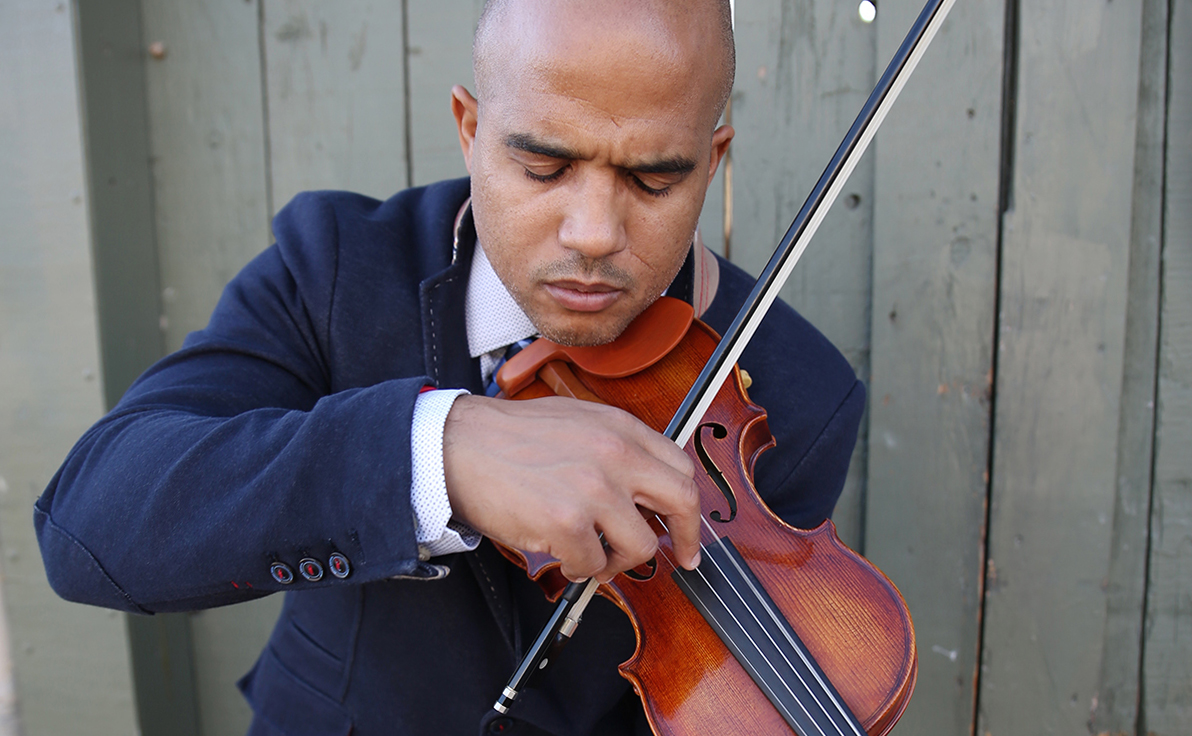Daniel Bernard Roumain on using music to effect change
For some, music is first and foremost entertainment. For composer/violinist/educator Daniel Bernard Roumain, aka DBR, music is certainly that but it’s also a vehicle for change—necessary change.
A Black Haitian American, DBR is blunt about the personal roots from which his musical activism and education arise. “Because it hurts. It hurts no matter how much you pray, you still feel like prey in your community,” he says of what drives his musical purpose. “That’s how it feels for me. That’s how it feels for my son who is 11. He’s very aware of the consequences of his actions or in some cases inactions. I wish I could perhaps ignore it or escape it. I know many artists do and I think that’s great. For me, my creative practice is one thing—creating work as an artist-activist dedicated to equitable change. Everything I do—teaching, parenting, learning—centers on that."
The Festival’s July 9 world premiere of DBR’s Twin Stars: Diamond Variations for Dae’Anna is the latest of his composing efforts to make a difference. Inspired by the killing of Philando Castile by a Minneapolis-Saint Paul police officer in 2016, the chamber music piece is written for string quartet, piano, and two singers. The libretto, by Marc Bamuthi Joseph, uses verbiage from the video Castile’s girlfriend, Diamond Reynolds, recorded while he was being detained by police. Reynold’s 4-year-old daughter, Dae’Anna, was in the back seat of the car.
The piece marks the launch of Musical Bridges, a multi-year initiative created by Festival Director Melvin Chen which commissions new works that place classical chamber music within a broader musical and cultural context. The hope is that through music, diverse communities and individuals can come together to explore shared values.
“Chamber music is not something fixed but something evolving and growing, and we need to participate in that,” Chen says of why he wanted to launch this new program.
For DBR, the need to address racism and other social issues is broader than simply placing notes on paper. “The performing arts field, like a lot of creative industries, should have been and needs to be focused on one thing—public health. If you’re truly focused on public health and the totality of it, [including] looking at an audience as someone you are charged with their care, then it becomes easy to say I would like an audience that is reflective of my community, an audience that the work I do helps them understand themselves and honors their struggle, their history. I’m in charge of an audience that needs my help to rehabilitate and repair, and even has a sense of compassion and education.”
Organizations need to be diverse, from the boards to the staff. “I would like to think that one of the lessons we have learned before COVID is that segregation isn’t in the best interest of public health. Monolithic laws based on race don’t work.
“As a country, we have agreed that diversity is an aspect of public health,” he adds. “We have agreed as a country that equity and desegregation and moves toward inclusion are in the best interest of public health. So classical music specifically needs to look at that as a guiding principle. If you have an orchestra that is not diverse, you can’t simultaneously say you’re committed to the best interests of public health.
“It is painful for me as a Black Haitian American composer to stand on a classical music stage and be surrounded by almost monolithically white people and in front of me are almost monolithically white people. That emotionally hurts.
“Norfolk Chamber Music Festival is doing the right thing by fully engaging Melvin Chen. He’s made a lot of changes. Because of that one hire, he’s creating equitable changes for the festival, which will create a more healthy organization and diversity for the audience.”
It starts with a title
DBR knew he wanted to compose a piece about the killing of Castile for Musical Bridges. “My music always starts with an idea,” he says. “Composing is the farming and framing of ideas.”
He does not begin composing, however, until he has a title. “A title has a sound,” DBR says of this process. “It’s a visceral way of composing. I know it’s the right title because after a period of struggle, when that title lands, there’s a particular feeling of completion and fullness. It’s almost euphoric. You know it’s the right title. It feels as though the title was always there and you’re discovering it.”
He describes what he hopes people will take away from Twin Stars: Diamond Variations for Dae’Anna. “This family woke up, had breakfast, got ready, got dressed, shared stories, laughter I‘m sure. We have a man, a woman, and their child in their car, driving down their American road.
“Who among us could be so poised and with their wits at a moment when a horror is unfolding,” DBR says of Castile’s partner recording the entire event. “He takes his last breath. There’s a moment when she’s comforting this officer. He’s lost it. He’s so distraught.
“I want the audience to feel the horror of that moment—the precise horror of that moment but also understand the boundlessness of the love within that family, the love in that care, the love captured on that Facebook Live [video] event,” DBR adds. “Those two simultaneous acts are captured in our nation’s history, acts of horror and acts of boundless empathy.”
Daniel Bernard Roumain's Twin Stars: Diamond Variations for Dae’Anna is part of the Festival's Musical Bridges project made possible through the generous support of the Desai Family Foundation.






